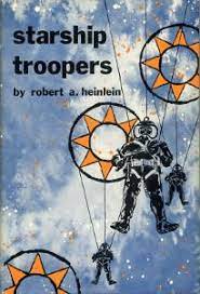Starship Trooperss

Starship Troopers is a military science fiction novel by American writer Robert A. Heinlein. Written
in a few weeks in reaction to the US suspending nuclear tests, the story was first published as a
two-part serial in The Magazine of Fantasy & Science Fiction as Starship Soldier, and published as a
book by G. P. Putnam's Sons in December 1959.
The story is set in a future society ruled by a human interstellar government dominated by a
military elite, referred to as the Terran Federation. The first-person narrative follows Juan
"Johnny" Rico through his military service in the Mobile Infantry. Rico progresses from recruit to
officer against the backdrop of an interstellar war between humans and an alien species known as
"Arachnids" or "Bugs". Interspersed with the primary plot are classroom scenes in which Rico and
others discuss philosophical and moral issues, including aspects of suffrage, civic virtue, juvenile
delinquency, and war; these discussions have been described as expounding Heinlein's own political
views. Starship Troopers has been identified with a tradition of militarism in US science
fiction, and draws parallels between the conflict between humans and the Bugs, and the Cold
War. A coming-of-age novel, Starship Troopers also critiques US society of the 1950s, arguing
that a lack of discipline had led to a moral decline, and advocates corporal and capital
punishment.
Starship Troopers brought to an end Heinlein's series of juvenile novels. It became one of his
best-selling books, and is considered his most widely known work. It won the Hugo Award for Best
Novel in 1960, and garnered praise from reviewers for its scenes of training and combat and its
visualization of a future military. It also became enormously controversial because of the
political views it seemed to support. Reviewers were strongly critical of the book's intentional
glorification of the military, an aspect described as propaganda and likened to
recruitment. The ideology of militarism and the fact that only military veterans had the right
to vote in the novel's fictional society led to it being frequently described as
fascist. Others disagree, arguing that Heinlein was only exploring the idea of limiting
the right to vote to a certain group of people. Heinlein's depiction of gender has also been
questioned, while reviewers have said that the terms used to describe the aliens were akin to racial
epithets.
Despite the controversy, Starship Troopers had wide influence both within and outside science
fiction. Ken MacLeod stated that "the political strand in [science fiction] can be described as a
dialogue with Heinlein". Science fiction critic Darko Suvin wrote that Starship Troopers is the
"ancestral text of US science fiction militarism" and that it shaped the debate about the role of
the military in society for many years. The novel has been credited with popularizing the idea
of powered armor, which has since become a recurring feature in science fiction books and films, as
well as an object of scientific research. Heinlein's depiction of a futuristic military was also
influential. Later science fiction books, such as Joe Haldeman's 1974 anti-war novel The Forever
War, have been described as reactions to Starship Troopers. The story has been adapted several
times, including in a 1997 film version directed by Paul Verhoeven with screenplay by Edward
Neumeier that sought to satirize what the director saw as the fascist aspects of the novel.
